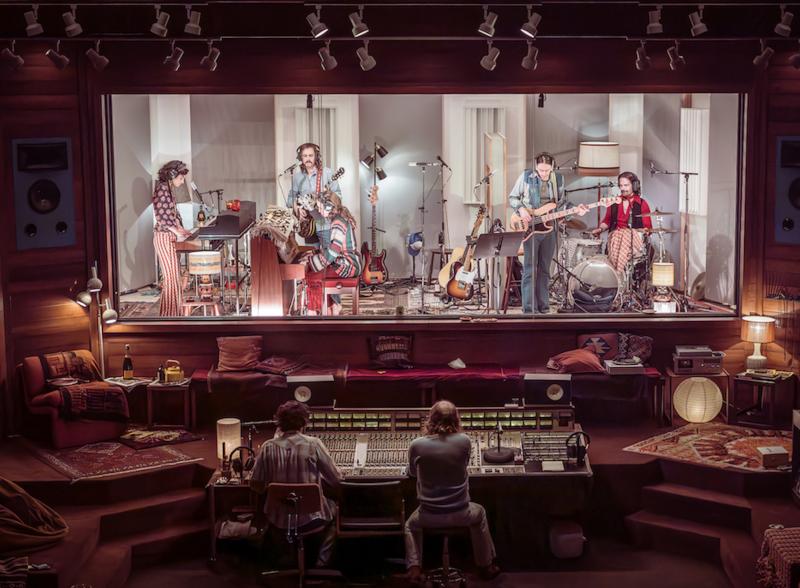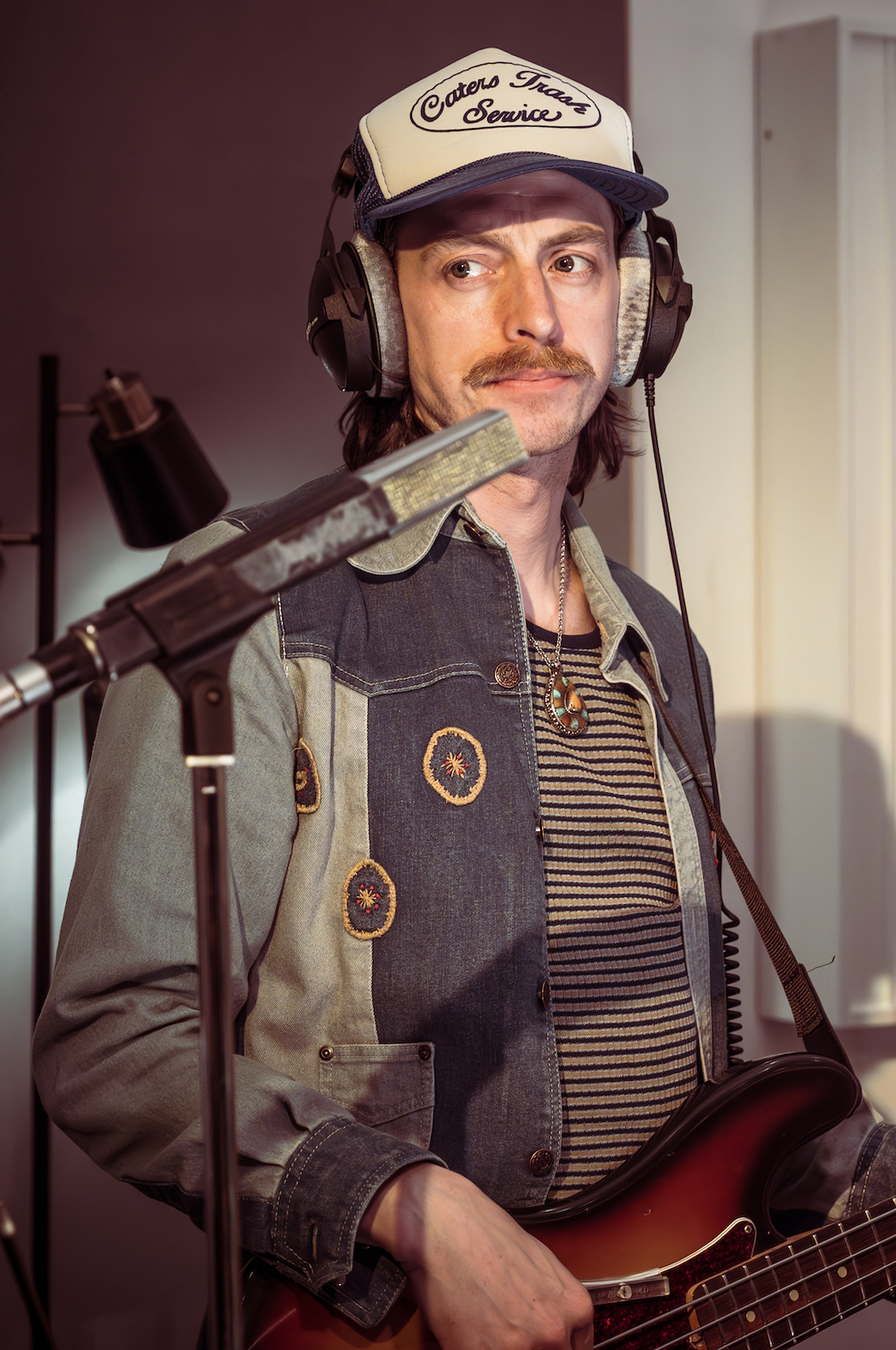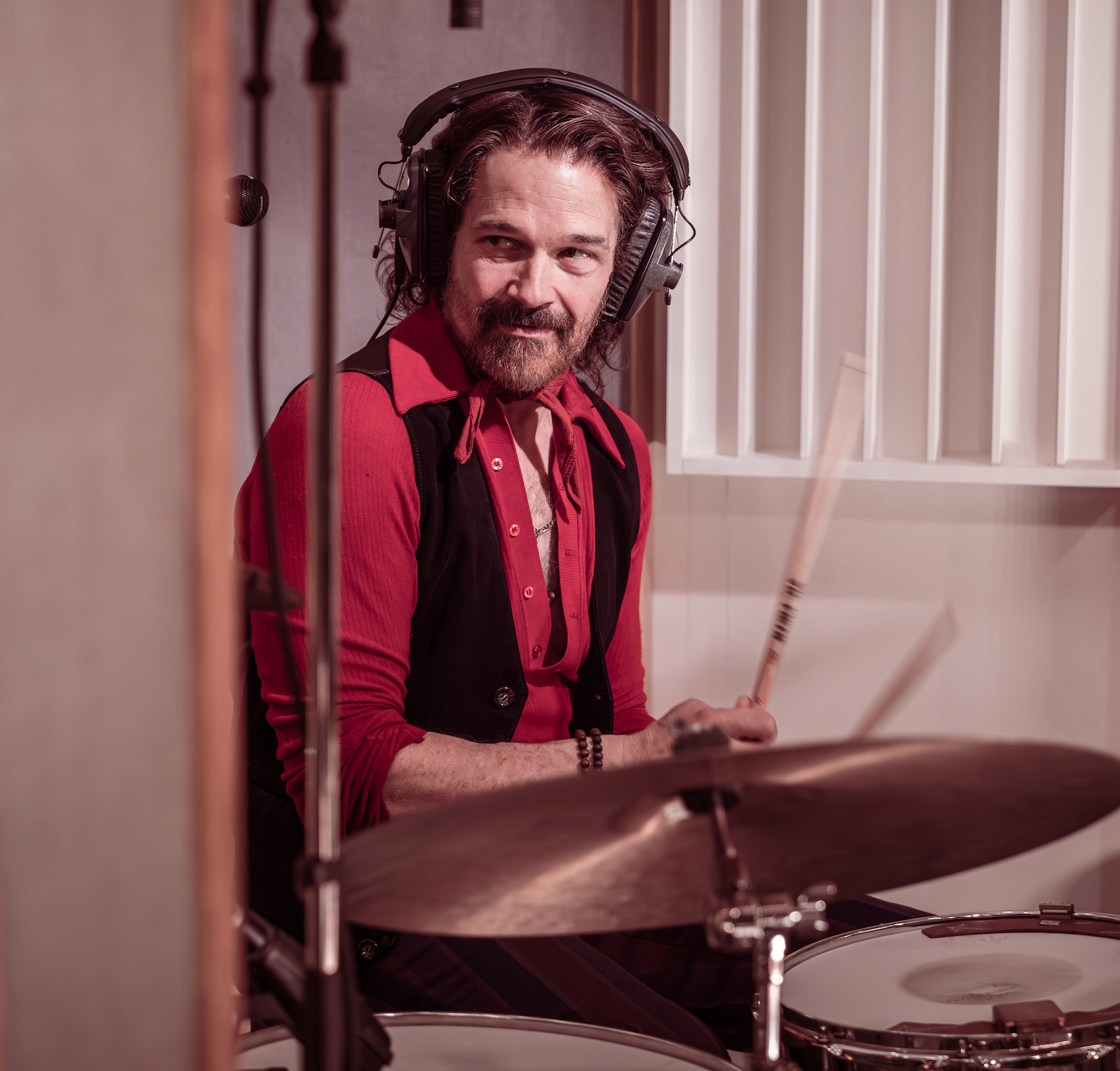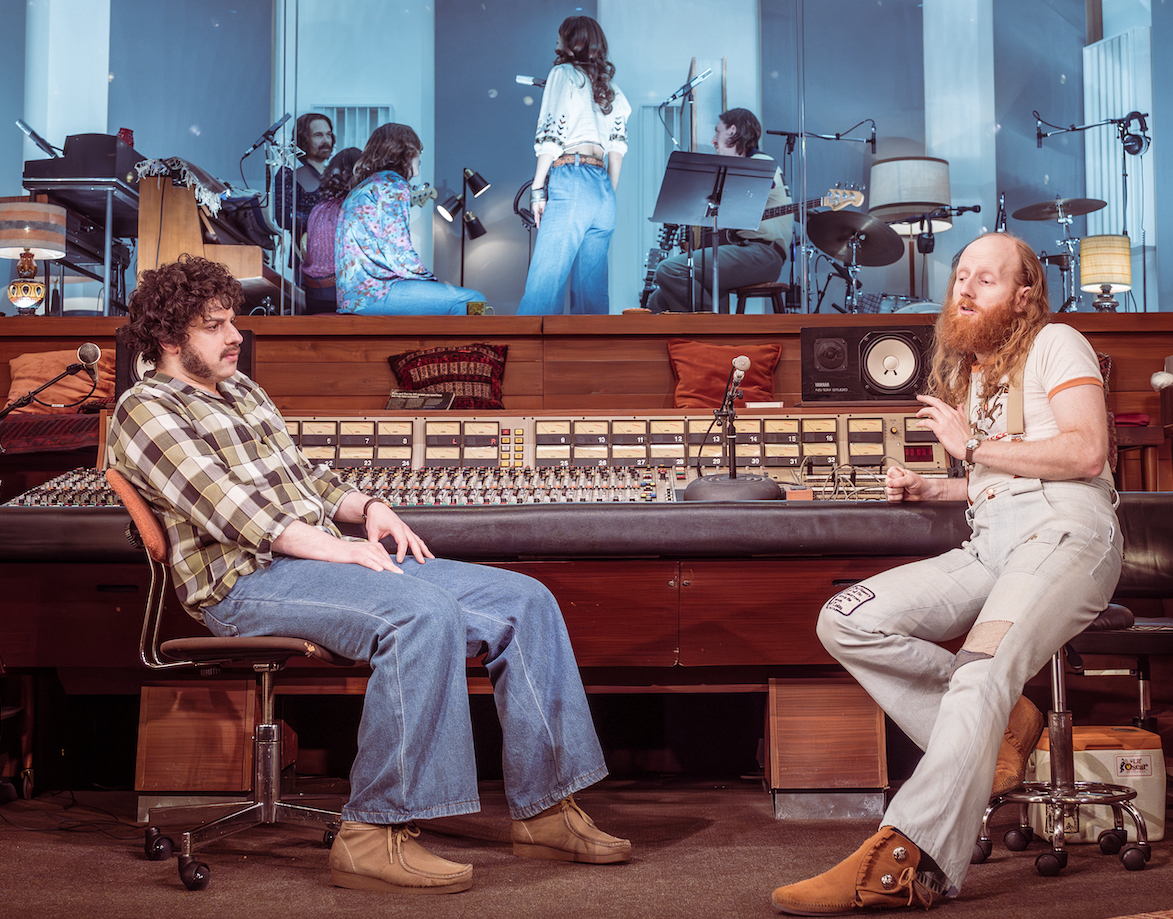Stereophonic, Duke of York's Theatre review - rich slice of creative life delivered by a 1970s rock band | reviews, news & interviews
Stereophonic, Duke of York's Theatre review - rich slice of creative life delivered by a 1970s rock band
Stereophonic, Duke of York's Theatre review - rich slice of creative life delivered by a 1970s rock band
David Adjmi's clever and compelling hit play gets a crack London cast

The tag “the most Tony-nominated play of all time” may mean less to London theatregoers than it does to New Yorkers, but Stereophonic, newly arrived at the Duke of York’s, deserves the accolade wherever it plays.
It has nothing to do with the Welsh band Stereophonics, though everything to do with typical rock band behaviour. Playwright David Adjmi hasn’t named the one we are watching, a band recording an album in 1976 that will make them megastars, as Rumours did for Fleetwood Mac, a band notoriously riven with breakdowns and divorces. But the internecine spats Adjmi’s group members engage in as the album’s gestation drags on, and six months become a year, are standard-issue for most gods of rock.
Or for any small, interdependent group of strong personalities who spend far too much time together, especially when at least one of them is a control freak and there is a bumper plastic bag of coke doing the rounds. The beauty of Stereophonic is that it uses all these rock tropes to offer universal truths about all humans engaged in creating something.
 David Zinn’s set suggests the twin worlds at work here. A giant glass box fills the back of the stage, where the instruments sit waiting. Equally outsized is the mixing desk, a barrage of knobs and buttons, surrounded by big armchairs. The control freak in our ensemble, alpha male of the glass box, is Peter (Jack Riddiford, pictured far right with Lucy Karczewski and Nia Towle), the long-haired Californian lead guitarist and co-producer of the album, who, true to type, wears aviator shades indoors.
David Zinn’s set suggests the twin worlds at work here. A giant glass box fills the back of the stage, where the instruments sit waiting. Equally outsized is the mixing desk, a barrage of knobs and buttons, surrounded by big armchairs. The control freak in our ensemble, alpha male of the glass box, is Peter (Jack Riddiford, pictured far right with Lucy Karczewski and Nia Towle), the long-haired Californian lead guitarist and co-producer of the album, who, true to type, wears aviator shades indoors.
His sexy girlfriend of nine years, Diana (Lucy Karczewski), is that emerging 1970s force, a female rock “frontman”, though one still dominated by her boyfriend/band leader, whom she resents for telling her she can’t bang a tambourine onstage and is, thus far, a mediocre songwriter. (Vocally, Karczewski is full-throated and ballsy, more like a modern soul singer than a Stevie Nicks). Privately, Diana is building a portfolio of plangent songs and preparing a solo career. Together, she and Peter test the boundary between the professional and the personal as the acrimony in their relationship intensifies. That big glass box is a pressure cooker, from which few emerge unscathed.
 In the blue corner are the Brits: drug-fuelled bassist Reg (Zachary Hart, pictured left), an impressionable soul with a young Pete Townshend vibe who announces he is going to seek bodily purity in the name of defeating “negative energy” – without giving up alcohol – and then moves on to imbibing the pseudo-mystical screeds of Carlos Castaneda. He has an on-off relationship with the hard-boiled keyboards player, Holly (Nia Towle), a self-professed “square” who sees relationships as a series of negotiations and believes marriage is for life.
In the blue corner are the Brits: drug-fuelled bassist Reg (Zachary Hart, pictured left), an impressionable soul with a young Pete Townshend vibe who announces he is going to seek bodily purity in the name of defeating “negative energy” – without giving up alcohol – and then moves on to imbibing the pseudo-mystical screeds of Carlos Castaneda. He has an on-off relationship with the hard-boiled keyboards player, Holly (Nia Towle), a self-professed “square” who sees relationships as a series of negotiations and believes marriage is for life.
The fifth musician is married drummer Simon, played by one of the three NY cast members in the London production, Chris Stack (pictured below, right). In a guessing game as to who those three Americans are, most might land, correctly, on the two sound engineers, Grover (Eli Gelb) and Charlie (Andrew R Butler), but not on Stack, whose English accent is pitch-perfect. His line of sarcasm is pure public school too. Riddiford is equally plausible as the driven West Coaster, a man who asks for a drum sound like going for a walk and suddenly discovering a corpse.
It’s hard to imagine a casting director finding British actors to play Grover and Charlie. Their banter is one of the highlights of the piece, a flow of locker-room boasts and remarks designed to show their status in the biz. In fact, Grover has lied on his CV, claiming a key role in an Eagles album recording, though we observe him genuinely growing into the role. His diatribe about the band's moods and demands is priceless. Charlie is the quintessential hanger-on, gossiping freely about people who don’t acknowledge his existence. His wispy ‘do and straggly face hair are perfect, his overalls a hint of his rural origins.
 Gelb (pictured bottom with Andrew B Butler) is the beating heart of the piece, sitting behind his mixing desk into the small hours, tweaking and playing with his tapes, lost in the sounds coming through his cans. He pointlessly lusts after Holly, a pudgy man Americans might call a schlub – until they got to know him. One of the punchiest spats comes when he rightly forces Simon to use a click track to keep his pacing up to speed. Grover is ultimately like a director, marshalling all his forces for the desired result, but destined to stand aside from the limelight and rarely get the girl.
Gelb (pictured bottom with Andrew B Butler) is the beating heart of the piece, sitting behind his mixing desk into the small hours, tweaking and playing with his tapes, lost in the sounds coming through his cans. He pointlessly lusts after Holly, a pudgy man Americans might call a schlub – until they got to know him. One of the punchiest spats comes when he rightly forces Simon to use a click track to keep his pacing up to speed. Grover is ultimately like a director, marshalling all his forces for the desired result, but destined to stand aside from the limelight and rarely get the girl.
The cleverness of the play’s staging is that, for all their talent, those performers are trapped in the big glass box whose sound Grover controls. In one funny scene, they try to indicate to him, busy discussing something with Charlie, that they can’t hear anything through their headphones. They form a spectral tableau, staring at him, silently gesticulating and powerless.
What makes this play greater than it might appear on paper is its approach to authenticity. Theatrical “reality” is often designed as a continuous stream of speeches and actions, until Beckett and Pinter et al upset that applecart. Stereophonic uses all the hiatuses, sometimes lengthy ones, that can punctuate a real event, especially one fraught with microaggressions that drive people offstage, forcing the action to stop until they return. It’s reminiscent of the world of Annie Baker’s plays, which similarly ignore many of the theatrical norms once considered essential. Such as not leaving a character alone onstage for too long in silence, doing nothing. There is a downside to this approach, obviously. Doldrums are doldrums, able to switch the brain off or send it looking for distractions. But these long fallow moments are a vital part of the mix, a suggestion of the tedium of the creative process. What they build to are the superb instances where suddenly everything works.
There is a downside to this approach, obviously. Doldrums are doldrums, able to switch the brain off or send it looking for distractions. But these long fallow moments are a vital part of the mix, a suggestion of the tedium of the creative process. What they build to are the superb instances where suddenly everything works.
Performed live by the actors, the music is by Will Butler, formerly of Arcade Fire. His songs manage to sound like mellow ‘70s rock, strong on female close harmonies, without descending into pastiche. At first, we hear only scraps sung by Grover as he listens on his headphones, or Diana recording her vocal lines a cappella, but slowly the songs emerge full-scale. In one of the best scenes, Peter makes the group lay down endless takes of a song before sending them home at 2am, only to bring them straight back to try the song at half the speed. Magically, it blooms.
Like the musicians labouring long hours in the studio, the director Daniel Aukin has reportedly spent 11 years working on this production: it was 11 years well spent.
The future of Arts Journalism
You can stop theartsdesk.com closing!
We urgently need financing to survive. Our fundraising drive has thus far raised £49,000 but we need to reach £100,000 or we will be forced to close. Please contribute here: https://gofund.me/c3f6033d
And if you can forward this information to anyone who might assist, we’d be grateful.

Subscribe to theartsdesk.com
Thank you for continuing to read our work on theartsdesk.com. For unlimited access to every article in its entirety, including our archive of more than 15,000 pieces, we're asking for £5 per month or £40 per year. We feel it's a very good deal, and hope you do too.
To take a subscription now simply click here.
And if you're looking for that extra gift for a friend or family member, why not treat them to a theartsdesk.com gift subscription?
more Theatre
 Edinburgh Fringe 2025 reviews: Ordinary Decent Criminal / Insiders
Two dramas on prison life offer contrasting perspectives but a similar sense of compassion
Edinburgh Fringe 2025 reviews: Ordinary Decent Criminal / Insiders
Two dramas on prison life offer contrasting perspectives but a similar sense of compassion
 Edinburgh Fringe 2025 reviews: Kinder / Shunga Alert / Clean Your Plate!
From drag to Japanese erotica via a French cookery show, three of the Fringe's more unusual offerings
Edinburgh Fringe 2025 reviews: Kinder / Shunga Alert / Clean Your Plate!
From drag to Japanese erotica via a French cookery show, three of the Fringe's more unusual offerings
 The Two Gentlemen of Verona, RSC, Stratford review - not quite the intended gateway drug to Shakespeare
Shakespeare trying out lots of ideas that were to bear fruit in the future
The Two Gentlemen of Verona, RSC, Stratford review - not quite the intended gateway drug to Shakespeare
Shakespeare trying out lots of ideas that were to bear fruit in the future
 Edinburgh Fringe 2025 reviews: The Horse of Jenin / Nowhere
Two powerful shows consider the Israeli-Palestinian conflict, with mixed results
Edinburgh Fringe 2025 reviews: The Horse of Jenin / Nowhere
Two powerful shows consider the Israeli-Palestinian conflict, with mixed results
 Edinburgh Fringe 2025 reviews: The Fit Prince / Undersigned
A joyful gay romance and an intimate one-to-one encounter in two strong Fringe shows
Edinburgh Fringe 2025 reviews: The Fit Prince / Undersigned
A joyful gay romance and an intimate one-to-one encounter in two strong Fringe shows
 Tom at the Farm, Edinburgh Fringe 2025 review - desire and disgust
A visually stunning stage re-adaptation of a recent gay classic plunges the audience into blood and earth
Tom at the Farm, Edinburgh Fringe 2025 review - desire and disgust
A visually stunning stage re-adaptation of a recent gay classic plunges the audience into blood and earth
 Works and Days, Edinburgh International Festival 2025 review - jaw-dropping theatrical ambition
Nothing less than the history of human civilisation is the theme of FC Bergman's visually stunning show
Works and Days, Edinburgh International Festival 2025 review - jaw-dropping theatrical ambition
Nothing less than the history of human civilisation is the theme of FC Bergman's visually stunning show
 Every Brilliant Thing, @sohoplace review - return of the comedy about suicide that lifts the spirits
Lenny Henry is the ideal ringmaster for this exercise in audience participation
Every Brilliant Thing, @sohoplace review - return of the comedy about suicide that lifts the spirits
Lenny Henry is the ideal ringmaster for this exercise in audience participation
 Edinburgh Fringe 2025 reviews: The Beautiful Future is Coming / She's Behind You
A deft, epoch-straddling climate six-hander and a celebration (and take-down) of the pantomime dame at the Traverse Theatre
Edinburgh Fringe 2025 reviews: The Beautiful Future is Coming / She's Behind You
A deft, epoch-straddling climate six-hander and a celebration (and take-down) of the pantomime dame at the Traverse Theatre
 Good Night, Oscar, Barbican review - sad story of a Hollywood great's meltdown, with a dazzling turn by Sean Hayes
Oscar Levant is an ideal subject to refresh the debate about media freedom
Good Night, Oscar, Barbican review - sad story of a Hollywood great's meltdown, with a dazzling turn by Sean Hayes
Oscar Levant is an ideal subject to refresh the debate about media freedom
 Edinburgh Fringe 2025 reviews - Monstering the Rocketman by Henry Naylor / Alex Berr
Tabloid excess in the 1980s; gallows humour in reflections on life and death
Edinburgh Fringe 2025 reviews - Monstering the Rocketman by Henry Naylor / Alex Berr
Tabloid excess in the 1980s; gallows humour in reflections on life and death
 Edinburgh Fringe 2025 reviews: Lost Lear / Consumed
Twists in the tail bring revelations in two fine shows at the Traverse Theatre
Edinburgh Fringe 2025 reviews: Lost Lear / Consumed
Twists in the tail bring revelations in two fine shows at the Traverse Theatre

Add comment